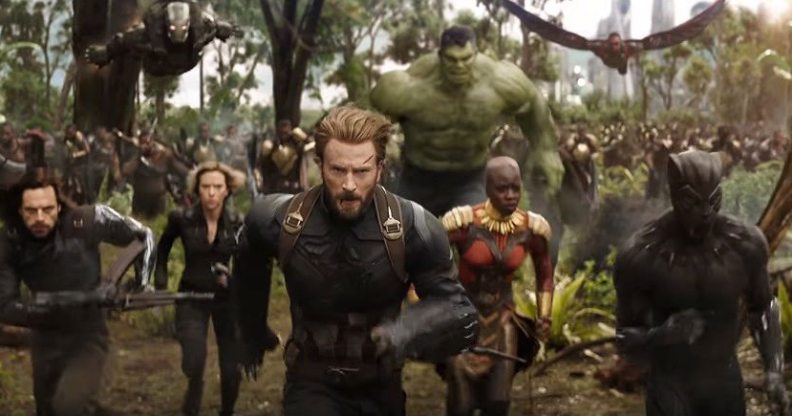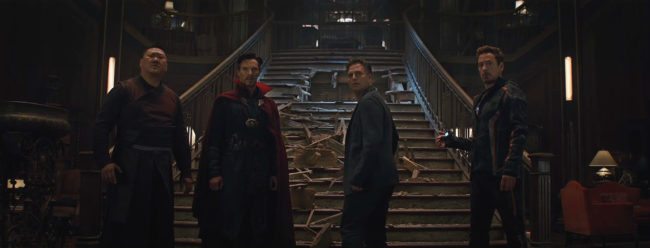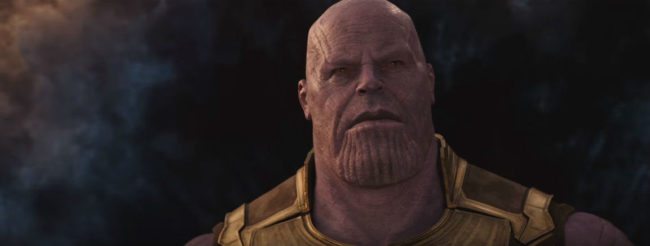‘Avengers: Infinity War’ review: Surprising, thrilling and packed with emotional punches

“Thanos is coming,” a worried-looking Bruce Banner pleads to Doctor Strange after he crashes down into the Sorcerer Supreme’s Sanctum Sanctorum. Oh boy, is he coming…
After playing puppet-master for 18 movies, Josh Brolin’s gauntlet-wielding super-villain finally faces the Avengers in Avengers: Infinity War as they try to stop him from obtaining all six infinity stones – gems that will bestow him with colossal, destructive powers.
Original team members Iron Man, Thor, Hulk, Captain America and Black Widow enlist the help of Black Panther, Time Stone-protector Doctor Strange and more. But will a group of even that size thwart the Mad Titan’s plans to bring balance to the universe by killing half its population?
On paper, Avengers: Infinity War seems like too big of an undertaking for anyone to pull off. Making time for a huge number of superheroes in a film that, not only has to culminate storylines 10 years in the making, but also excite and satisfy loyal viewers, is a gargantuan task.
So, it seems almost miraculous to say that screenwriters Christopher Markus and Stephen McFeely and directors the Russo brothers (almost) nail it.
From the film’s tragedy-filled opening sequence, the trio’s ability to balance character and combat is evident as they waste no time plunging us into the action. They use the remaining run-time wisely by forcing our heroes into distinct groups—ensembles that often result in some much-needed levity.

Scarlet Witch and Vision – who has an infinity stone in his head – find themselves targeted by baddie Thanos (Marvel Studios)
Thor finds himself hitching a ride with the Guardians of the Galaxy, much to the dismay of Peter Quill, who finds it impossible to hide the inferiority complex precipitated by the Asgardian god’s appearance.
Elsewhere, Iron Man and Doctor Strange trade scathing quips at one another, while the ever-optimistic Peter Parker tries to keep the peace, and Steve Rogers and Black Panther continue to be the diplomatic dudes they’re so well-known to be.
As the adopted daughter of Thanos, it’s Gamora who plays the most integral part in Infinity War though. Not only does she explain – to both us and the others – what his game plan is, she actually spends a lot of time with her estranged parent. These scenes are drenched in pathos and are arguably the film’s strongest. It’s just a shame that so many of her scenes are so CGI-heavy as it distracts from Zoe Saldana’s stellar work.
Distraction is an occurring issue, in fact.
There’s a little too much going on at times. Most scenes are action-driven and, despite being expertly executed, could really do with some breathing room between them.
As Thanos races from planet to planet to collect the stones, you become increasingly aware that this film is primarily setting things up for a sequel and isn’t necessarily that concerned with its own narrative.
Similarly, the movie does feel a little frantic at times as we jump from Earth to the cosmos and back again to intermittently check in with certain heroes.

Benedict Cumberbatch’s Doctor Strange shares centre stage with a couple of other characters in Avengers: Infinity War (Marvel Studios)
Despite the scene-hopping, some characters – namely Black Widow, Black Panther and Cap – do end up being underused, most of them not even allowed more than one line of dialogue, let alone an arc.
But it’s evident that Markus and McFeely know we’re already familiar with these faces and realise that spending more time establishing their place in the grand scheme of things is simply wasteful. After all, this isn’t about them this time round, it’s about the fight.
The Marvel Cinematic Universe, as this franchise of films is known, has had a bit of a problem with villains, or more accurately, creating stakes in previous movies. That’s largely down to the antagonists not really being all that evil, nor successful. Loki was always more friend than foe, Helmut Zemo was just a broken-hearted man and Kilmonger – while great – was achingly sympathetic.
Things improved in Age of Ultron when James Spader’s android villain Ultron took on the likes of Iron Man, Cap and Thor. He was scary, but even he – with his eerie charm and surprising naivety – isn’t a patch on Thanos.
Thanos is a straight-up douchebag. A purple alien with a maddeningly evil plan, whose ego is almost as big as his dimpled chin. He’s blinded by his vision and will stop at nothing to achieve his goal.
He’s also overwhelmingly powerful. His lackeys alone – deliciously devilish Black Order members Ebony Maw and Proxima Midnight – are more formidable than half of the heroes on display here.
Basically, he’s not a good enemy to have if you’re looking at it from an Avenger’s perspective.

Josh Brolin’s Thanos is one of the MCU’s best villains yet (Marvel Studios)
Thanos is one of the best antagonists we’ve seen across the entire Marvel Cinematic Universe. You actively dislike him, and the hell he’s putting these characters you’ve grown so fond of over the years through. Plus, you’re never really sure how, or even if, our heroes are going to beat him, which makes both him – and scenes where he goes up against the Avengers – thrilling and wildly unpredictable.
Of course, something we all knew was coming in this movie is death. That is a concept that has typically been absent from the MCU so far.
There are plenty of lines in Infinity War that forebode just how much the titular team are out of their depth – “In time, you will know what it’s like to lose” and “It’s not overselling it to say that the fate of the universe is at stake” – but it’s actually a moment from 2016’s Captain America: Civil War that most alludes to the events that unfold during Marvel’s latest.
In that film, Cap – in an attempt to ease Scarlet Witch’s pain over accidentally killing civilians on a mission – explains: “We try to save as many people as we can. Sometimes that doesn’t mean everybody. But if we can’t find a way to live with that, next time… maybe nobody gets saved.”
Why is that so poignant now? Because it succinctly explains the burden of having to save the world while simultaneously trying to protect those closest to you during battle – a theme that has always been present throughout the Marvel movies but really comes to a head here.
Better grab yourself a Vibranium shield because the emotional twists sure do pack a punch.

